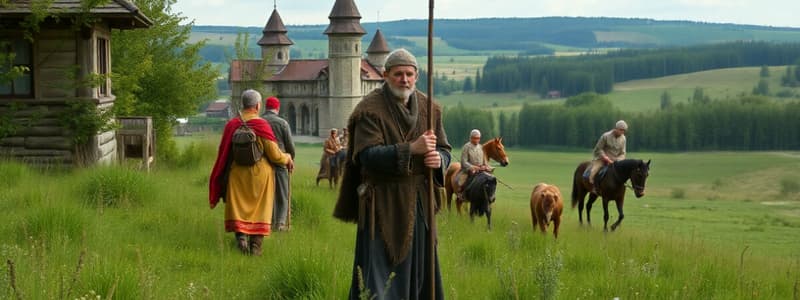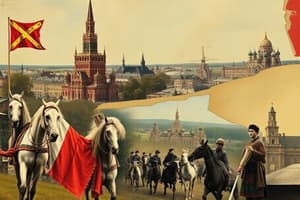Podcast
Questions and Answers
The Kievan Rus was primarily known for its agricultural economy.
The Kievan Rus was primarily known for its agricultural economy.
False (B)
The Fourth Crusade had a devastating impact on the trade of the Kievan Rus.
The Fourth Crusade had a devastating impact on the trade of the Kievan Rus.
True (A)
Batu Khan led a campaign against the Kievan Rus that began in 1237.
Batu Khan led a campaign against the Kievan Rus that began in 1237.
True (A)
Moscow remained a small trading post and had little impact on the Mongol Empire.
Moscow remained a small trading post and had little impact on the Mongol Empire.
The western regions of the former Kievan Rus were heavily influenced by the Mongols.
The western regions of the former Kievan Rus were heavily influenced by the Mongols.
The tribes that spread through Eastern Europe in the first millennium had a writing system of their own.
The tribes that spread through Eastern Europe in the first millennium had a writing system of their own.
Rurik expanded the Kievan Rus' realm into the south and established the capital in Novgorod.
Rurik expanded the Kievan Rus' realm into the south and established the capital in Novgorod.
The Kievan Rus' derived its name from a Slavic term for the region.
The Kievan Rus' derived its name from a Slavic term for the region.
Vladimir I decided to adopt Islam after considering the three major religions.
Vladimir I decided to adopt Islam after considering the three major religions.
The Byzantines created an alphabet for Slavic languages based on a modified Latin script.
The Byzantines created an alphabet for Slavic languages based on a modified Latin script.
The Kievan Rus' had peaceful relations with its neighbors, avoiding any warfare.
The Kievan Rus' had peaceful relations with its neighbors, avoiding any warfare.
The Dniester River is one of the boundaries of the eastern branch of the tribes mentioned.
The Dniester River is one of the boundaries of the eastern branch of the tribes mentioned.
Nestor compiled the Primary Chronicle in the 12th century, detailing the history of the Kievan Rus'.
Nestor compiled the Primary Chronicle in the 12th century, detailing the history of the Kievan Rus'.
Flashcards
Kievan Rus'
Kievan Rus'
A medieval state in Eastern Europe, formed by uniting Slavic tribes and Viking rule.
Rurik
Rurik
A Viking prince who led the formation of Kievan Rus'.
Primary Chronicle
Primary Chronicle
A 12th century account of the history of the East Slavic tribes' formation into Kievan Rus'.
Slavic Tribes
Slavic Tribes
Signup and view all the flashcards
Religious Conversion
Religious Conversion
Signup and view all the flashcards
Volga Route
Volga Route
Signup and view all the flashcards
Byzantine Empire
Byzantine Empire
Signup and view all the flashcards
Viking Influence
Viking Influence
Signup and view all the flashcards
Kievan Rus' decline
Kievan Rus' decline
Signup and view all the flashcards
Mongol invasion
Mongol invasion
Signup and view all the flashcards
Moscow's rise
Moscow's rise
Signup and view all the flashcards
Fragmentation of Kievan Rus'
Fragmentation of Kievan Rus'
Signup and view all the flashcards
Impact of the Fourth Crusade
Impact of the Fourth Crusade
Signup and view all the flashcards
Study Notes
Origins of Russia
- Early Slavic tribes populated Eastern Europe, with no written language. Evidence came from archaeology, accounts from other cultures, and the 12th-century Primary Chronicle.
- By the 7th century, these tribes (sharing a Slavic language and polytheistic religion) split into western, southern, and eastern branches, spanning the Dniester to Volga and Baltic.
- Initially, Vikings dominated the region until revolts led to their return to establish order. Crucially, Vikings did not wear horned helmets in battle.
- Rurik and his brothers became rulers, expanding south under Oleg, establishing Kiev (a former Khazar outpost) as the capital. This led to Kievan Rus'.
Kievan Rus' Flourishing
- Kievan Rus' interacted with its neighbors (Khazar, Byzantine Empires) in both alliance and conflict.
- Religion significantly impacted politics; in 987, Prince Vladimir I converted to Orthodox Christianity, deepening ties with the Byzantine Empire.
- Adoption of Orthodox Christianity and trade along the Volga Route fostered cultural exchange. Byzantine missionaries created a Slavic alphabet.
- Kievan Rus' flourished with trade, resources, and significant cultural achievements, including marriages with European royals, literacy, and advancements in some cities.
Decline of Kievan Rus'
- Internal conflicts over succession eroded central power; independent cities and rival princes competed for control.
- External factors, like the Fourth Crusade devastation of Constantinople and the threat from Teutonic crusaders, affected trade and power.
- The Mongol invasion (35,000 mounted archers led by Batu Khan) in 1237 decisively ended Kievan Rus', sacking Kiev and destroying the state.
Emergence of Russia
- Eastern Rus' (remaining under Mongol rule) saw Moscow develop and challenge the fragmented Mongol Empire.
- Moscow annexed other Eastern territories and adopted the Greek form "Russia."
- Western Rus' territories, strategically avoiding destruction, were influenced by Poland and Lithuania.
- Distinct societal, cultural, and linguistic differences emerged between the eastern and western regions of the former Kievan Rus'.
Studying That Suits You
Use AI to generate personalized quizzes and flashcards to suit your learning preferences.




